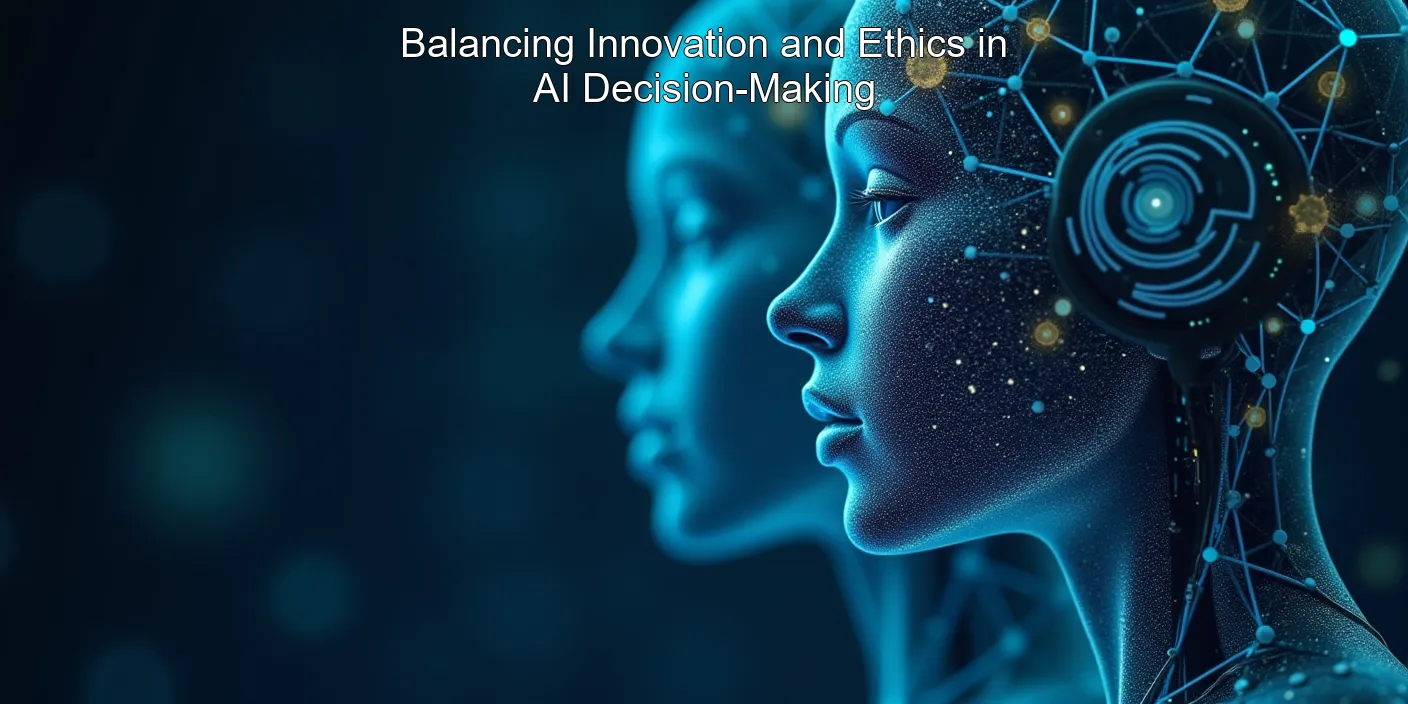Ensuring Responsible and Accountable AI Decision-Making: A Comprehensive Guide
| Key Aspects | Description |
|---|---|
| Transparency | Clear explanation of AI decision processes |
| Fairness | Unbiased treatment of all individuals |
| Accountability | Responsibility for AI-driven outcomes |
As AI systems become increasingly prevalent in our daily lives, ensuring their responsible and accountable decision-making is crucial. Here are the key elements to consider:

“Ensuring Responsible AI in Everyday Life”
#AIResponsibility, #DecisionMaking, #EthicalAI
- Algorithmic transparency
- Bias mitigation strategies
- Regular audits and assessments
- Human oversight and intervention
“The goal of AI is not to replace humans, but to empower them to make better decisions.” – Fei-Fei Li, AI researcher and professor at Stanford University
FAQ: Responsible AI Decision-Making
Q: How can we ensure AI decisions are fair?
A: Implement diverse training data, regular bias checks, and fairness metrics in AI models.
Q: What role do humans play in AI decision-making?
A: Humans should provide oversight, interpret results, and intervene when necessary to ensure ethical outcomes.
Q: How can organizations be held accountable for AI decisions?
A: Establish clear governance structures, documentation processes, and mechanisms for addressing AI-related concerns.
5 Steps to Implement Responsible AI Decision-Making
- Develop a comprehensive AI ethics policy
- Establish diverse and inclusive AI development teams
- Implement robust testing and validation procedures
- Create transparent reporting mechanisms
- Continuously educate stakeholders on AI ethics
According to a 2021 survey by Gartner, only 35% of organizations have established AI governance policies. This highlights the urgent need for more widespread adoption of responsible AI practices.
“AI Governance: Urgent Need & Five-Step Implementation Guide”
Balancing Innovation and Ethics in AI

| Challenge | Solution |
|---|---|
| Rapid technological advancements | Agile ethical frameworks |
| Complex decision-making scenarios | Multi-stakeholder collaboration |
| Potential for unintended consequences | Proactive risk assessment |
Balancing innovation with ethical considerations is a key challenge in AI development. To address this, consider the following approaches:
- Integrating ethics into the AI development lifecycle
- Fostering interdisciplinary collaboration
- Encouraging open dialogue on AI ethics
- Investing in AI safety research
“Ethics cannot be an afterthought in AI development. It must be woven into the fabric of innovation from the start.” – Timnit Gebru, AI ethics researcher
FAQ: Ethical AI Innovation
Q: How can companies innovate responsibly with AI?
A: By integrating ethical considerations into their R&D processes and fostering a culture of responsible innovation.
Q: What are the risks of neglecting ethics in AI development?
A: Potential risks include biased outcomes, privacy violations, and erosion of public trust in AI technologies.
Q: How can we ensure AI benefits all of society?
A: By prioritizing inclusive design, addressing societal challenges, and promoting equitable access to AI technologies.
Best Practices for Ethical AI Innovation
- Conduct regular ethical impact assessments
- Engage diverse stakeholders in AI development
- Prioritize explainable AI techniques
- Implement robust data governance practices
- Foster a culture of ethical awareness among AI practitioners
A study by the MIT Sloan Management Review found that 67% of executives believe that AI will play a significant role in their company’s future success. This underscores the importance of integrating ethical considerations into AI strategies.
As we continue to push the boundaries of AI Innovations, it’s crucial to prioritize responsible and accountable decision-making. By embracing ethical AI practices, we can harness the full potential of AI in Everyday Life while mitigating potential risks. The future of AI in Entertainment and other industries depends on our ability to balance innovation with Ethical AI principles, ensuring a positive impact on society as a whole.
The Importance of Responsible AI in Decision-Making
| Key Aspect | Importance |
|---|---|
| Transparency | Critical for trust |
| Accountability | Essential for ethical use |
| Fairness | Prevents bias and discrimination |
As AI systems increasingly influence our lives, ensuring their responsibility in decision-making processes has become paramount. Let’s explore the key elements of responsible AI and how they shape our future.
- Implement robust ethical guidelines
- Establish clear accountability frameworks
- Regularly audit AI systems for bias
- Promote transparency in AI algorithms
“The development of full artificial intelligence could spell the end of the human race… It would take off on its own, and re-design itself at an ever-increasing rate.” – Stephen Hawking
FAQ: Responsible AI in Decision-Making
Q: How can we ensure AI decisions are fair?
A: Regular audits, diverse training data, and bias detection algorithms are crucial for fair AI decisions.
Q: What role does transparency play in responsible AI?
A: Transparency allows stakeholders to understand how AI makes decisions, building trust and accountability.
Q: How can organizations implement responsible AI practices?
A: By establishing ethical guidelines, conducting regular assessments, and fostering a culture of responsible innovation.
5 Steps to Implement Responsible AI in Decision-Making
- Develop a comprehensive ethical framework
- Establish diverse and inclusive AI development teams
- Implement rigorous testing and validation processes
- Create clear accountability and oversight mechanisms
- Continuously educate stakeholders on AI ethics
According to a recent study by Gartner, 75% of organizations will shift from piloting to operationalizing AI by 2024, highlighting the urgent need for responsible AI practices.
Balancing Innovation and Ethics in AI Decision-Making

| Challenge | Solution |
|---|---|
| Rapid technological advancement | Proactive ethical guidelines |
| Potential job displacement | Reskilling and upskilling programs |
| Data privacy concerns | Robust data protection measures |
Striking the right balance between innovation and ethics is crucial for the responsible development of AI. As we push the boundaries of what’s possible, we must remain vigilant about the potential impacts on society.
“Balancing Innovation and Ethics: Navigating AI’s Societal Impact”
- Foster collaboration between technologists and ethicists
- Implement ethical impact assessments for AI projects
- Develop AI systems with built-in ethical constraints
- Encourage public discourse on AI ethics
“The real question is, when will we draft an artificial intelligence bill of rights? What will that consist of? And who will get to decide that?” – Gray Scott
FAQ: Balancing Innovation and Ethics
Q: How can companies innovate responsibly with AI?
A: By integrating ethical considerations into the development process and conducting regular impact assessments.
Q: What are the risks of prioritizing innovation over ethics in AI?
A: Potential risks include biased decision-making, privacy violations, and erosion of public trust.
Q: How can governments support responsible AI innovation?
A: Through balanced regulations, funding for ethical AI research, and promoting public-private partnerships.
Best Practices for Ethical AI Decision-Making
- Prioritize explainability in AI models
- Implement robust data governance policies
- Conduct regular ethical audits of AI systems
- Foster a culture of responsible innovation
- Engage with diverse stakeholders for feedback
A survey by PwC reveals that 85% of CEOs believe AI will significantly change the way they do business in the next five years, underscoring the importance of ethical considerations in AI adoption.
As we navigate the complex landscape of AI in decision-making, it’s crucial to prioritize responsibility and ethics. By implementing robust frameworks and fostering a culture of ethical innovation, we can harness the power of AI while safeguarding societal values. For more insights on Ethical AI, explore our comprehensive resources. Discover how AI in Everyday Life is shaping our world, and stay updated on the latest AI Innovations. Don’t miss out on exploring the exciting developments in AI in Entertainment to see how technology is transforming our leisure experiences.
Understanding AI’s Role in Decision-Making
| Key Aspect | Description |
|---|---|
| AI’s Function | Data analysis, pattern recognition, prediction |
| Human Involvement | Oversight, interpretation, final decision-making |
| Ethical Considerations | Bias mitigation, transparency, accountability |
As AI continues to revolutionize decision-making processes, it’s crucial to understand its role and limitations. Here are the key aspects to consider:
- AI excels at processing vast amounts of data
- It can identify patterns humans might miss
- AI provides data-driven insights for informed decisions
- Human judgment remains essential for context and ethics
“AI is a powerful tool, but it’s the human touch that transforms data into wisdom.” – Dr. Fei-Fei Li, AI researcher and professor at Stanford University
FAQ: AI in Decision-Making
Q: Can AI make decisions entirely on its own?
A: While AI can process data and provide recommendations, human oversight is crucial for ethical and contextual considerations.
Q: How can we ensure AI decisions are unbiased?
A: Regular audits, diverse training data, and human review processes help mitigate bias in AI decision-making.
Q: What are the risks of over-relying on AI for decisions?
A: Over-reliance can lead to overlooking nuanced factors, potential bias amplification, and reduced human critical thinking skills.
Tips for Responsible AI Decision-Making
- Implement robust testing and validation processes
- Ensure transparency in AI algorithms and decision criteria
- Maintain human oversight and final decision authority
- Regularly update and refine AI models with new data
According to a recent study by Gartner, 75% of organizations will shift from piloting to operationalizing AI by 2024, highlighting the growing importance of responsible AI implementation.
Ethical Considerations in AI-Assisted Decision-Making

| Ethical Aspect | Implementation Strategy |
|---|---|
| Fairness | Diverse data sets, algorithmic audits |
| Transparency | Explainable AI models, clear documentation |
| Accountability | Human oversight, clear chain of responsibility |
Ensuring ethical AI decision-making is paramount for building trust and avoiding unintended consequences. Consider these key points:
- Implement rigorous bias detection and mitigation strategies
- Prioritize explainable AI models for transparency
- Establish clear accountability frameworks
- Engage in ongoing ethical training for AI developers and users
“The ethical implementation of AI is not just a technical challenge, but a societal imperative.” – Satya Nadella, CEO of Microsoft
FAQ: Ethical AI Decision-Making
Q: How can we ensure AI decisions align with human values?
A: Incorporate ethical guidelines into AI development, involve diverse stakeholders, and conduct regular ethical audits.
Q: What role does transparency play in ethical AI?
A: Transparency builds trust, allows for scrutiny, and helps identify potential biases or errors in AI decision-making processes.
Q: How can organizations balance innovation with ethical considerations?
A: By integrating ethics into the core of AI development and fostering a culture of responsible innovation.
Best Practices for Ethical AI Implementation
- Develop a comprehensive AI ethics policy
- Create diverse, cross-functional teams for AI development
- Implement regular ethical impact assessments
- Engage with external ethics boards for independent oversight
A study by Deloitte found that 32% of organizations are actively addressing AI ethics concerns, indicating a growing awareness of the importance of ethical AI implementation.
As we navigate the complex landscape of AI-assisted decision-making, it’s crucial to balance innovation with responsibility. By implementing robust ethical frameworks and maintaining human oversight, we can harness the power of AI while ensuring decisions align with our values and societal needs. The journey towards responsible AI is ongoing, requiring continuous learning, adaptation, and collaboration across industries and disciplines.

For more insights on the ethical implications of AI, explore our Ethical AI section. To understand how AI is transforming various aspects of our lives, check out AI in Everyday Life. For cutting-edge developments in AI technology, visit our AI Innovations page. And to see how AI is reshaping the entertainment industry, don’t miss our AI in Entertainment category.



